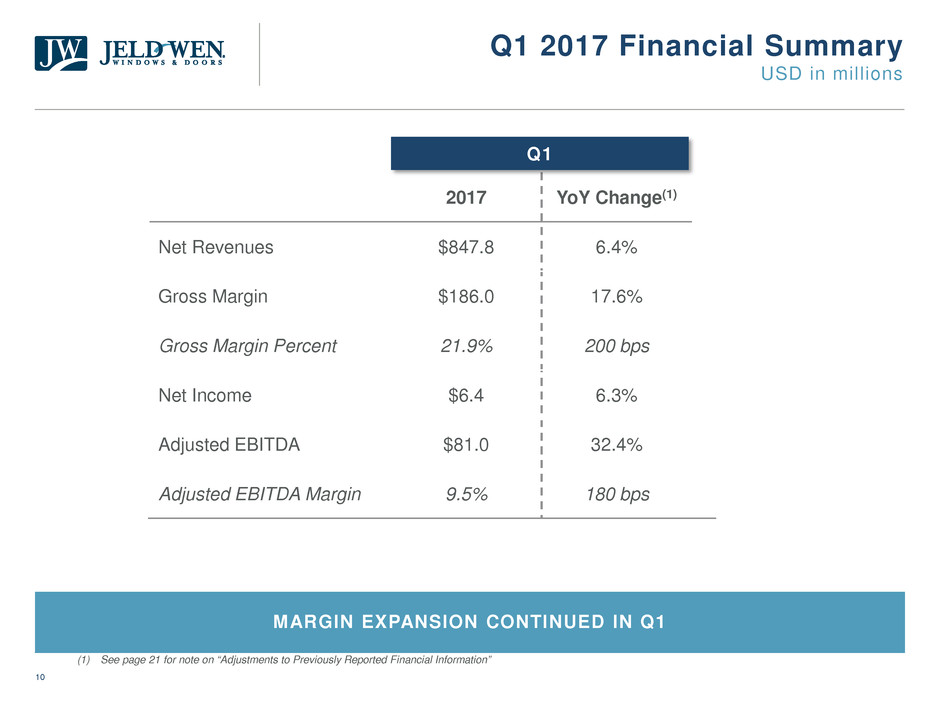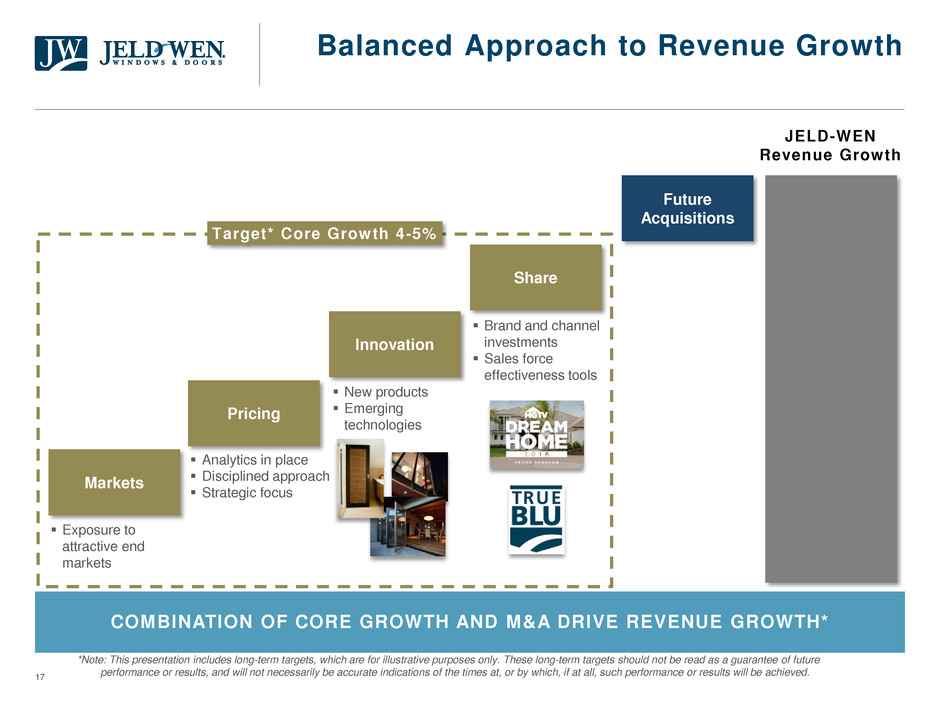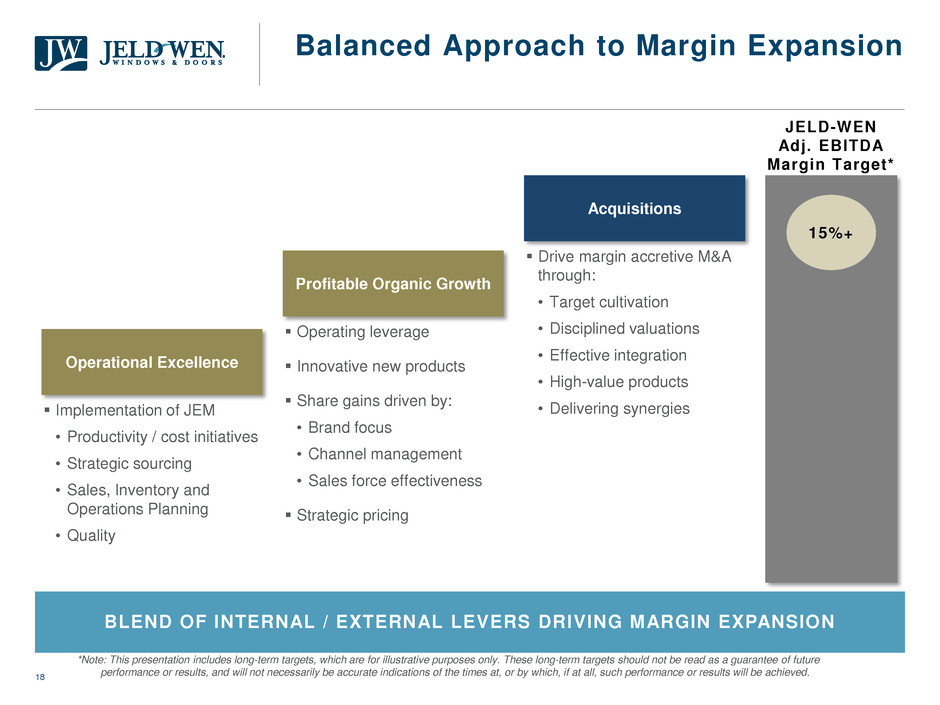Attached files
| file | filename |
|---|---|
| EX-99.1 - EXHIBIT 99.1 - JELD-WEN Holding, Inc. | jeld-wenq12017ex991.htm |
| 8-K - 8-K - JELD-WEN Holding, Inc. | jeld-wenq120178xk.htm |

1 P R I V I L E G E D A N D C O N F I D E N T I A L
\\intranet.barcapint.com\dfs-amer\group\Nyk\area\ibd\Industrial\Companies\Jeld-Wen\2015.07 Project Jamaica Dual Track\2015.10 IPO Execution\Presentation\Roadshow Presentation\Project Falcon_Roadshow Presentation_(1.13.17)_vNear Final_v10pm
Q1 2017 Results Presentation | May 9, 2017

2
Disclosures
Forward-Looking Statements
This presentation contains certain "forward-looking statements" regarding business strategies, market potential, future financial performance, the potential of our categories and
brands, and our expectations, beliefs, plans, objectives, prospects, assumptions, or other future events. Forward-looking statements are generally identified by our use of forward-
looking terminology such as “anticipate”, “believe”, “continue”, “could”, “estimate”, “expect”, “intend”, “may”, “might”, “plan”, “potential”, “predict”, “seek”, or “should”, or the negative
thereof or other variations thereon or comparable terminology. Where, in any forward-looking statement, we express an expectation or belief as to future results or events, such
expectation or belief is based on the current plans, expectations, assumptions, estimates, and projections of our management. Although we believe that these statements are based
on reasonable expectations, assumptions, estimates and projections, they are only predictions and involve known and unknown risks, many of which are beyond our control that could
cause actual outcomes and results to be materially different from those indicated in such statements.
Our actual results could differ materially from the results contemplated by these forward-looking statements due to a number of factors, including the factors discussed in our
prospectus filed with the Securities and Exchange Commission on January 30, 2017, and our Annual Report on Form 10-K for the year ended December 31, 2016, to be filed with the
Securities and Exchange Commission.
The assumptions underlying the guidance provided for 2017 include the achievement of anticipated improvements in end markets, competitive position, and product portfolio; stable
macroeconomic factors; no changes in foreign currency exchange and tax rates; and favorable interest expense due to the recent debt reduction. The forward-looking statements
included in this presentation are made as of the date hereof, and except as required by law, we undertake no obligation to update, amend or clarify any forward-looking statements to
reflect events, new information or circumstances occurring after the date of this presentation.
Non-GAAP Financial Measures
This presentation presents certain “non-GAAP” financial measures. The components of these non-GAAP measures are computed by using amounts that are determined in
accordance with accounting principles generally accepted in the United States of America (“GAAP”). A reconciliation of non-GAAP financial measures used in this presentation to their
nearest comparable GAAP financial measures is included at the end of this presentation. The Company provides certain guidance on a non-GAAP basis because the Company
cannot predict certain elements that are included in certain reported GAAP results, including the variables and individual adjustments necessary for a reconciliation to GAAP.
We use Adjusted EBITDA and Adjusted EBITDA margin because we believe they assist investors and analysts in comparing our operating performance across reporting periods on a
consistent basis by excluding items that we do not believe are indicative of our core operating performance. Management believes Adjusted EBITDA and Adjusted EBITDA margin are
helpful in highlighting trends because they exclude the results of decisions that are outside the control of management, while other measures can differ significantly depending on
long-term strategic decisions regarding capital structure, the tax jurisdictions in which we operate, and capital investments. We use Adjusted EBITDA and Adjusted EBITDA margin to
measure our financial performance and also to report our results to our board of directors. Further, our executive incentive compensation is based in part on Adjusted EBITDA. In
addition, we use Adjusted EBITDA as calculated herein for purposes of calculating compliance with our debt covenants in certain of our debt facilities. Adjusted EBITDA should not be
considered as an alternative to net income (loss) as a measure of financial performance or to cash flows from operations as a liquidity measure.
We define Adjusted EBITDA as net income (loss), eliminating the impact of the following items: loss from discontinued operations, net of tax; gain (loss) on sale of discontinued
operations, net of tax; equity (earnings) loss of non-consolidated entities; income tax; depreciation and amortization; interest expense, net; impairment and restructuring charges; gain
on sale of property and equipment; share-based compensation expense; non-cash foreign exchange transaction/translation income (loss); other non-cash items; other items; and
costs related to debt restructuring, debt refinancing, and the Onex investment. Adjusted EBITDA margin is defined as Adjusted EBITDA divided by net revenues.
We present free cash flow because we believe it assists investors and analysts in determining the quality of our earnings. We also use free cash flow to measure our financial
performance and to report to our board of directors. In addition, our executive incentive compensation is based in part on free cash flow. We define free cash flow as cash flow from
operations less purchases of property, equipment, and intangible assets. Free cash flow should not be considered as an alternative to cash flows from operations as a liquidity
measure.
Other companies may compute these measures differently. No non-GAAP metric should be considered as an alternative to any other measure derived in accordance with GAAP.
Due to rounding, numbers presented throughout this document may not sum precisely to the totals provided and percentages may not precisely reflect the absolute figures.

3
Introduction
Mark Beck, President and CEO

4
JELD-WEN at a Glance
Global market leader in windows and doors
Q1 2017 LTM Net Revenues of $3.7 billion and
Adj. EBITDA of $414 million (~11.1% margin)
Scaled platform creating competitive advantage
• 115 manufacturing facilities in 19 countries
• 20,000+ employees
• 13,000+ customers
Long-standing customer relationships with
home centers, builders and independent dealers
Six strategic acquisitions in the past 18
months – all on track to deliver strong ROI
Business Highlights
Key Brands
Net Revenues Mix(1)
ApplicationProduct Geography
(1) Based on FY2016 results.
GLOBAL MARKET LEADER WITH UNMATCHED SCALE
A us t ra l as i a
14%
E urope
27%
N .A .
59%
N on-R es i .
10%
R es i .
R epa i r &
R em ode l
45%
R es i . N ew
C ons t ruc t i o n
45%
Othe r
9%
W i ndows
24%
D oors
67%

5
An Extraordinary Transformation Underway
PROVEN TEAM DRIVING EARNINGS GROWTH AND FREE CASH FLOW
Adjusted EBITDA Margin %
Where We Are Today
Our Proven Operating Model
Early stages of a multi-year turnaround
A global platform with scale, iconic brands and
leading market positions
A team of accomplished leaders assembled
from the best Industrials (Danaher, Cooper,
UTC, etc.) executing a proven operating model
• Self-help: quality, productivity, sourcing
• Steady profitable growth: price, innovation,
share-gain
• Strategic M&A: as an industry consolidator
Where We Are Going
1
2
3
4.4%
11.1%
15%+
FY 2013 Target*LTM Q1 2017
*Note: This presentation includes long-term targets, which are for illustrative purposes only. These long-term targets should not be read as a guarantee of future
performance or results, and will not necessarily be accurate indications of the times at, or by which, if at all, such performance or results will be achieved.

6
Proven Operating Model
Target Identification
Target Cultivation
Stage Gate Process
Integration Playbook
Performance Tracking
Strategic M&AOperational Excellence
Talent Management, JELD-WEN Excellence Model (JEM), and Enabling Technology
WORLD-CLASS PERFORMANCE AND RETURNS
New Products and Innovation
Brand Strategy
Channel Management
Sales Force Effectiveness
Pricing Optimization
Profitable Organic Growth
Safety and Compliance
Quality System
Customer Experience
Productivity
Sourcing

7
Operational Excellence
JELD-WEN Excellence Model (JEM)
ESTABLISHING A CONTINUOUS IMPROVEMENT CULTURE
2016 2017 2018 20192014 2015
Phase I: Establish mindset of discipline
(e.g., Operating Cadence, Gemba Walks)
Phase II: Deploy fundamental JEM tools
(e.g., Daily Visual Management System, Basic Problem Solving, Standard
Work, Model Area, 5S)
Phase III: Deploy intermediate JEM tools
(e.g., Total Productive Maintenance Cycle Time
Reduction, Kaizen, Kanban, etc.)
Phase IV: Continuously deploy
advanced tools
(e.g., Policy Deployment, Obeya, etc.)
Ongoing
Commitment
to Continuous
Improvement
JEM
Culture:

8
BUSINESS TRANSFORMATION DRIVING EARNINGS AND FCF IMPROVEMENT
Net Revenue Growth Free Cash Flow(1)
Financial Performance
USD in millions
$61.2
$81.0
7.7%
9.5%
Q1 2016 Q1 2017
% Margin
Adjusted EBITDA
(1) Free Cash Flow is defined as cash flow from operating activities minus (i) purchases of property and equipment and (ii) purchases of intangible assets.
$796.5
$847.8
Q1 2016 Q1 2017
($49.0)
($18.0)
Q1 2016 Q1 2017
6.4% increase 32.4% increase $31 mill ion increase

9
Financial Review
Brooks Mallard, EVP and Chief Financial Officer

10
MARGIN EXPANSION CONTINUED IN Q1
2017 YoY Change(1)
Net Revenues $847.8 6.4%
Gross Margin $186.0 17.6%
Gross Margin Percent 21.9% 200 bps
Net Income $6.4 6.3%
Adjusted EBITDA $81.0 32.4%
Adjusted EBITDA Margin 9.5% 180 bps
Q1 2017 Financial Summary
USD in millions
Q1
(1) See page 21 for note on “Adjustments to Previously Reported Financial Information”

11
Q1 2017
Pricing 2% 2% 1% 1%
Volume/Mix 4% 3% 5% 6%
Core Growth 6% 5% 6% 7%
Acquisitions 1% 0% 0% 12%
FX (1%) 0% (4%) 5%
Total 6.4% 5.2% 1.6% 24.1%
CORE GROWTH MOMENTUM CONTINUES ACROSS ALL REGIONS
Q1 Net Revenues Walk
JELD-WEN North America Europe Australasia

12
CORE GROWTH DRIVING GROWTH IN EARNINGS AND MARGIN
2017 YoY Change
Net Revenues $484.1 5.2%
Adjusted EBITDA $50.2 58.3%
Adjusted EBITDA Margin 10.4% 350 bps
North America Segment Performance
USD in millions
Q1
Wood Windows Vinyl Windows Interior Doors Exterior Doors Wall Systems

13
SIGNIFICANT MARGIN IMPROVEMENT ON FLAT USD REVENUES IN 2016
2017 YoY Change
Net Revenues $242.3 1.6%
Adjusted EBITDA $27.2 10.2%
Adjusted EBITDA Margin 11.2% 80 bps
Europe Segment Performance
USD in millions
Q1
Residential Doors Commercial Doors Fire Resistant Sound Dampening Security Doors

14
RECENT ACQUISITIONS DRIVING TOP-LINE GROWTH
2017 YoY Change
Net Revenues $121.4 24.1%
Adjusted EBITDA $13.2 48.5%
Adjusted EBITDA Margin 10.9% 180 bps
Australasia Segment Performance
USD in millions
Q1
Windows Doors Shower Enclosures Closet Systems Specialty Windows

15
Balance Sheet and Cash Flow
USD in millions
NET LEVERAGE REDUCED TO 2.56x; SIGNIFICANT LIQUIDITY
Balance Sheet and Liquidity April 1, 2017 December 31, 2016(1)
Total Debt $1,245.8 $1,620.0
Cash $185.5 $102.7
Total Net Debt $1,060.3 $1,517.3
Net Debt / Adjusted EBITDA 2.56x 3.85x
Liquidity (2) $448.4 $381.9
Cash Flow Q1 2017 Q1 2016
Cash Flow From Operations ($8.2) ($28.2)
Capital Expenditures (3) ($9.8) ($20.8)
Free Cash Flow ($18.0) ($49.0)
( 1 ) D o e s n o t r e f l e c t t h e i mp a c t o f p r o c e e d s r e c e i v e d f r o m i n i t i a l p u b l i c o f f e r i n g s u b s e q u e n t t o y e a r e n d .
( 2 ) L i q u i d i t y i n c l u d e s c a s h a n d a v a i l a b i l i t y f r o m u n d r a wn r e v o l v i n g c r e d i t f a c i l i t i e s .
( 3 ) I n c l u d e s p u r c h a s e s o f p r o p e r t y , e q u i p me n t , a n d i n t a n g i b l e a s s e t s .

16
Summary and 2017 Outlook
Mark Beck, President and Chief Executive Officer

17
Balanced Approach to Revenue Growth
COMBINATION OF CORE GROWTH AND M&A DRIVE REVENUE GROWTH*
Future
Acquisitions
Markets
Pricing
Innovation
Share
Exposure to
attractive end
markets
Analytics in place
Disciplined approach
Strategic focus
New products
Emerging
technologies
Brand and channel
investments
Sales force
effectiveness tools
Target* Core Growth 4-5%
JELD-WEN
Revenue Growth
*Note: This presentation includes long-term targets, which are for illustrative purposes only. These long-term targets should not be read as a guarantee of future
performance or results, and will not necessarily be accurate indications of the times at, or by which, if at all, such performance or results will be achieved.

18
Balanced Approach to Margin Expansion
BLEND OF INTERNAL / EXTERNAL LEVERS DRIVING MARGIN EXPANSION
Acquisitions
15%+
JELD-WEN
Adj. EBITDA
Margin Target*
Profitable Organic Growth
Operational Excellence
Implementation of JEM
• Productivity / cost initiatives
• Strategic sourcing
• Sales, Inventory and
Operations Planning
• Quality
Operating leverage
Innovative new products
Share gains driven by:
• Brand focus
• Channel management
• Sales force effectiveness
Strategic pricing
Drive margin accretive M&A
through:
• Target cultivation
• Disciplined valuations
• Effective integration
• High-value products
• Delivering synergies
*Note: This presentation includes long-term targets, which are for illustrative purposes only. These long-term targets should not be read as a guarantee of future
performance or results, and will not necessarily be accurate indications of the times at, or by which, if at all, such performance or results will be achieved.

19
2017 Outlook
USD in millions
OUTLOOK BASED ON CONTINUED MARGIN IMPROVEMENT IN 2017
Original
Net Revenue Growth 1.5% – 3.5% 1.5% – 3.5%
Adjusted EBITDA $435 – $455 $440 – $460
Capital Expenditures $90 – $100 $90 – $100
Updated

20
Appendix

21
Adjusted EBITDA Reconciliation
USD in millions
NOTE: Adjustments to Previously Reported
Financial Information
During the first quarter ended April 1, 2017, we
identified errors related to the tax treatment of our
share-based compensation expense and the inter-
quarter allocation of a tax benefit associated with
the release of a valuation allowance in a foreign
jurisdiction reported for the year ended December
31, 2016. The amounts are not material to the
periods impacted, and we have elected to revise
our previously issued consolidated financial
statements in our upcoming filings to correct the
prior periods. In addition to the tax corrections, we
also revised the financial statements for other
accumulated misstatements impacting the period.
The cumulative impact of the corrections for the
three months ended March 26, 2016 was an
increase in share-based compensation expense of
$0.4 million and a decrease in tax expense of $0.1
million. The corrections had no impact on cash
flow or adjusted EBITDA. Please refer to our
Form 10-Q for the three-month period ended April
1, 2017 for additional details.
Three months ending
April 1, 2017 March 26, 2016
Net Income (loss) $6.4 $6.0
Adjustments:
Loss (income) from discontinued operations, net of tax $0.0 ($0.5)
Equity (earnings) loss of non-consolidated entities ($0.5) ($0.8)
Income tax expense (benefit) $2.3 $2.1
Depreciation and amortization $27.1 $25.7
Interest expense, net(a) $26.9 $17.0
Impairment and restructuring charges $1.2 $2.9
Gain on sale of property and equipment ($0.0) ($3.6)
Share-based compensation expense $5.4 $5.1
Non-cash foreign exchange transaction/translation (income) loss $4.4 $5.0
Other non-cash items $0.0 $0.4
Other items(b) $7.6 $1.8
Costs relating to debt restructuring and debt financing $0.3 $0.0
Adjusted EBITDA $81.0 $61.2
(a) For the tree months ended April 1, 2017, interest expense includes the write-off of $7.0 million of original issue
discount and deferred financing fees related to the repayment of $375 million of debt
(b) Other items not core to business activity include: (i) in the three-months ended April 1, 2017, (1) $5.7 million in legal
costs, (2) $0.5 million in facility shut down costs, and (3) $0.3 million in IPO costs; and (ii) in the three-months ended
March 26, 2016, (1) $0.9 million in acquisition costs, (2) $0.3 million in Dooria plant closure costs, and (3) $0.2 million
of tax consulting costs in Europe.
